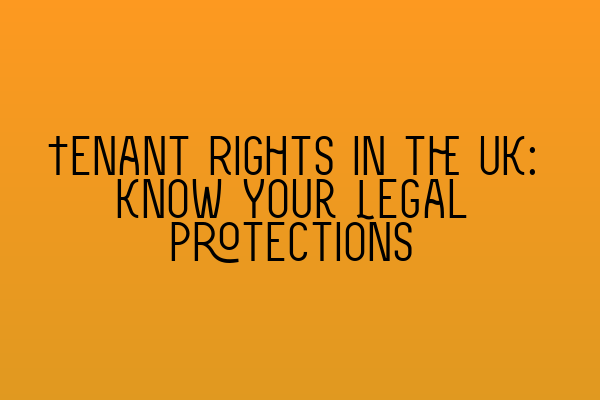Tenant Rights in the UK: Know Your Legal Protections
As a tenant in the UK, it is essential to be aware of your rights and legal protections. Understanding these can help you navigate the rental market, ensure a fair tenancy agreement, and safeguard yourself against any potential disputes. In this blog post, we will explore the key tenant rights in the UK that you should know.
1. Right to a Written Tenancy Agreement
One of the fundamental rights of a tenant in the UK is the right to a written tenancy agreement. This document outlines the terms and conditions of the tenancy, including the rent amount, tenancy duration, and responsibilities of both the tenant and the landlord. It is crucial to carefully review and understand the agreement before signing it.
If you are unsure about any clauses or terms in the agreement, seek legal advice to ensure that your rights are protected. Remember, a well-drafted tenancy agreement is the foundation of a successful tenancy.
2. Protection from Unfair Rent Increases
Tenants in the UK have legal protections against unfair rent increases. According to the law, landlords must provide at least one month’s notice for a rent increase if the tenancy is periodic (month-to-month) and at least six months’ notice if the tenancy is fixed-term.
If you receive a notice of rent increase that you believe is unfair or unreasonable, you should seek expert advice. It is crucial to understand your rights in negotiating rent increases and ensure that you are not being taken advantage of by your landlord.
3. Deposits and Deposit Protection Schemes
When renting a property in the UK, your landlord may require you to pay a security deposit. This deposit acts as a safety net for the landlord in the event of damage to the property or unpaid rent. However, there are legal protections in place to ensure that your deposit is handled fairly.
Landlords are required by law to protect your deposit in a government-approved tenancy deposit protection scheme. This scheme safeguards your deposit and ensures that you are entitled to its return at the end of your tenancy, provided you have met your obligations as a tenant.
4. Repairs and Maintenance Responsibilities
Landlords have a legal duty to ensure that the property they rent out is safe and in a good state of repair. As a tenant, you have the right to live in a property that is free from hazards and meets certain health and safety standards.
If you encounter any issues with repairs or maintenance, promptly notify your landlord or the managing agent in writing. Keep copies of all communication, as it will serve as evidence in case of a dispute. If your landlord fails to address the issue, you may be entitled to legal remedies, such as requesting repairs or seeking compensation.
5. Protection Against Unlawful Eviction
Under UK law, tenants are protected against unlawful eviction or harassment by their landlords. It is illegal for a landlord to evict a tenant without going through the proper legal process, which typically involves obtaining a court order.
If you believe you are facing an unlawful eviction, seek legal advice immediately. It is essential to understand your rights and take the necessary steps to protect yourself and your tenancy.
In conclusion, knowing your tenant rights is crucial for a smooth and successful tenancy in the UK. Understanding the terms of your tenancy agreement, your rights regarding rent increases and deposit protection, and the landlord’s responsibilities for repairs and maintenance will help you feel empowered and secure in your rental property.
For further resources and information on SQE exams, preparation, and dates, please check out the following related articles:
– SQE 1 Practice Exam Questions
– SQE 1 Practice Mocks FLK1 FLK2
– SQE 2 Preparation Courses
– SQE 1 Preparation Courses
– SRA SQE Exam Dates
Remember, professional legal advice is always recommended to ensure that your rights are fully protected, and you have a clear understanding of your rights and obligations as a tenant in the UK.
